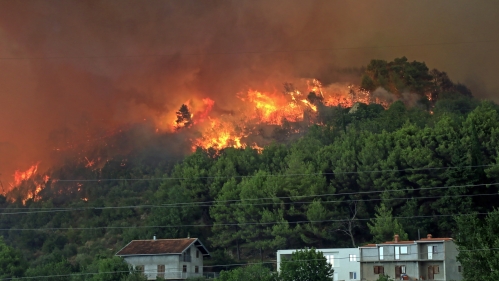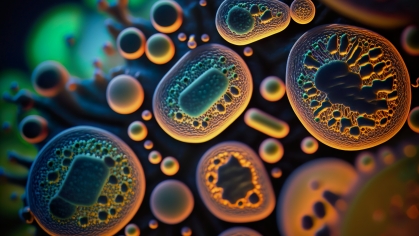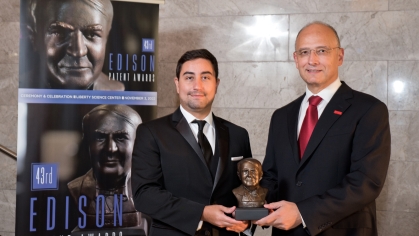Professors and Students Win EPA Cleaner Indoor Air During Wildfires Challenge

A Rutgers School of Engineering student team led by mechanical and aerospace engineering faculty members German Drazer and Edward DeMauro are among the Phase 1 winners of the EPA Cleaner Indoor Air During Wildfires Challenge.
The winners receive prizes of up to $10,000 for their proposed technologies that could help keep household air clean when wildfire smoke and other air pollutants reach unhealthy levels.
The Challenge
The EPA challenged participating teams to propose new, cost-effective approaches and technologies able to keep indoor air clean when air pollutants elevate outdoor fine particulate matter concentrations (PM2.5) – the small particles linked to respiratory and cardiovascular health issues, especially for those with heart and lung diseases.
When the air quality is deemed unhealthy by the EPA’s Air Quality Index, people are urged to stay inside in rooms where the air is filtered. Yet air-cleaning technologies are not only expensive to buy, run, and maintain, they rely on electricity, which is often subject to outages during wildfires and other events.
Jayesh Ratnam, a manufacturing engineer with Weitron Inc. who earned his master’s in mechanical engineering in October, joined the collaborative team because his thesis on particle interaction with filtration systems and their effects of their fiber arrangements on filtration efficiency was relevant to the EPA challenge.
“I also liked the idea of providing people with easy and cheap solutions to help them avoid breathing polluted air from wildfires,” he says. “I saw this project as an opportunity to contribute in any way possible to the idea of mitigating the harmful effects of wildfires.”
Erdi Kurtyigit, mechanical engineering doctoral candidate and one of the team’s group leaders, agrees. “If we can contribute to humanity and nature with this project, it will be a great pleasure to me. I think our success in the competition is the first step towards this goal.”
The Solution
According to DeMauro, the winning proposal began as an outgrowth of a concept that he and Drazer had been working on for a couple of years. “We’ve been looking at ways to use water as an alternative filtration system for small-scale particles. The students were part of a previous effort to put together a proposal for a NASA challenge for filtering lunar dust from the breathing air within a lunar habitat.”
The team decided the NASA concept, while not a winner, was sound enough to continue to develop as an ash filtration system for the EPA Cleaner Indoor Air During Wildfires Challenge. The team itself, according to Kurtyigit, was highly collaborative, attracting student members not only from the mechanical engineering department, but also from environmental science, electrical engineering, and physics.
The team’s winning proposal was for a two-phase air filtration device. “It’s a new application of existing industrial technology that will be modified and downsized for residential use,” explains Kurtyigit. “In addition, one of the requirements of the challenge is that the total cost of the device must be less than $100. I can say that this was challenging.”
Ultimately, the team predicts that roughly 94% of PM2.5 in a 1,200-cubic-foot-room would be removed within one hour.
Making a Prototype
DeMauro is looking forward to Phase 2 of the project, when Phase 1 winners will be invited to submit a prototype of their technology. “We are currently looking at moving forward with this immediately with the same team – including students who have graduated.”
The professors are actively pursuing funding opportunities for building their prototype. According to Drazer, they have begun discussions with Innovation Ventures @ Rutgers about IP issues and funding opportunities within the university’s Tech Advance program.
The win means a great deal to all involved. As Ratnam explains, “Ours was selected among hundreds of other designs in an open challenge not limited to university students. There were so many things I learned through this experience – and the win was certainly the icing on the cake.”


